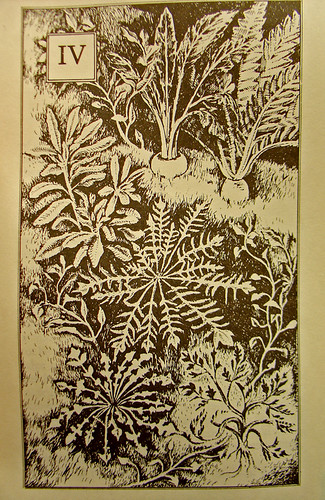
woodblock print from Masanobu Fukuoka’s ‘One Straw Revolution’ reaped from Culiblog and used twice without permission
Nothing to give.
catalogue essay
Moon Garden
Mikala Dwyer
Aratoi – Wairarapa Museum of Art and History
Masterton, Aotearoa New Zealand
december 08 – february 09
“Natural farming†is a method of land use developed by Masanobu Fukuoka (1913-2008) on his mountainside farm and orchard in southern Japan. Known also as “Do-nothing†farming for Mr. Fukuoka’s recommendation of doing away with unnecessary work, its grounding is in the four principles of no cultivation, no fertilisers, no weeding and no chemicals. His plentiful crops of rice, citrus and vegetables demonstrated that with careful observation and minimal tending, land left to itself will find a natural pattern and balance. Using cooperative systems of green manure cover crops, rice straw mulches and small grazing animals the Fukuoka method shows that even the most depleted soils can be restored, healing the land and maybe even the spiritual wellbeing of the practicing farmer.
Depletion is a state of mind and body experienced more and more by the practicing artist. Feeling bone-tired, weary, spent, with nothing left to give can be commonly caused by voluntary over-work, overstretched generosity, strained communications and confused collaborations. Like the exhausted soils kept in high rotation with synthetic fertilisers by agri-business, the normalising of hyper-productivity in the arts seems to be displacing the once typical cycle of production, rest and renewal. Prolonged production, protracted exhaustion and conditioned coping have become contemporary customs. How to be a field left fallow? Stuart Koop once wrote a beautiful observation of the reasons and benefit in artists “stopping†– whether to take a break, reconsider, do some full-time paid work, have a baby or re-train in a parallel discipline. Twigging that no higher-up need grant permission for a thoughtful suspension of one’s practice holds a certain lure and appeal.
Failing stopping, backing out or owning up to workaholism, a next best strategy might be working truthfully with the quality of energy that you have. Integrating sustenance and life world pleasures in the process. Mikala Dwyer is tired. Sitting and sewing the names of all the lakes, seas, bays and swamps on the moon onto a seventeen metre long banner slows time into a meditation – on the poignancy of a nomenclature assigned by just one man (early scientist and Jesuit priest Giovanni Battista Riccioli) and the bad horror films she can watch at the same time. This catalogue of time and lunar poetry (Sea of Vapours – Lake of Forgetfulness – Swamp of Rot) is one strand of the pleasure the artist is taking in fashioning another world. For her installation at the Aratoi Wairarapa Museum of Art and History, Dwyer is modelling her own cosmology in oblique manifestations of the Sun, the Earth and the Moon. Scheming a bigger, somehow simpler system (yet still tangled with the human temperament), the Moon becomes a banner, the Earth an abstracted plastic garden and the Sun a surprise… to be seen. Animating this homespun celestial scape, barely moving footage of a meteor in the Natural History Museum in New York plays out a quiet contradiction of propulsion and stoppage. A low-watt cosmic force for energy-saving times.
Japanese visitors to Shinto shrines report a feeling of renewal as a reliable benefit of time taken in such reflection. Building moments of replenishment and realignment into a practice, a life, a process, makes sense. At the close of the Aratoi show, Dwyer speaks of tending to the return of her works to the world that they came from. The unwieldy plastic sculpture, having travelled a good span of the globe and various international storage arrangements, will be broken down and recycled – living on as Coke bottles in future landfill. While the plants it’s hosted may be literally sent “back to earthâ€, planted out in the museum grounds and left behind to begin again.
Lisa Kelly
december 08.
